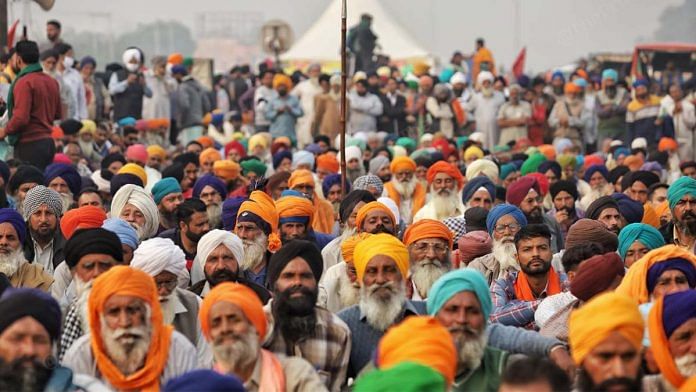
New Delhi: The tenth round of negotiations between the Narendra Modi government and the farmer unions Wednesday saw a climbdown of sorts by the Centre, with the government interlocutors led by Union Agriculture Minister Narendra Singh Tomar proposing to suspend the three new farm laws for one or one-and-a-half years, until the standoff is resolved, ThePrint has learnt.
According to government sources, the Centre could file an affidavit before the Supreme Court stating that it will put the law on hold and set up a committee to look threadbare into the various issues, including the provisions in the three laws that the farmers are opposing, and a legal guarantee for minimum support price (MSP).
Speaking to reporters after the meeting ended at Delhi’s Vigyan Bhawan, Tomar said he is hopeful of a resolution between the government and the farmer unions on 22 January, when the next round of talks are scheduled.
“I’m happy that farmer unions have taken this very seriously and will convey their decision on 22 January,” Tomar told reporters.
Refusing to relent from their demand seeking a total repeal of farm laws, the farmer unions told Tomar and the other Union ministers that they will hold a meeting with all the 500 farm organisations Thursday to decide whether to accept or reject the government proposal.
However, the unions agreed to attend the next round of meeting.
“We will hold an internal meeting tomorrow with all our leaders. But farmers all over the country are in favour of total repeal. We will meet the government again on 22 January,” said Rakesh Tikait, national spokesperson, Bharatiya Kisan Union.
Hannan Mollah, general secretary, All India Kisan Sabha, told ThePrint that the unions have also asked the government to withdraw all the cases registered against the farmers.
“The government said they will look into the matter,” he said, adding that the government has asked them to provide the names of leaders against whom new cases have been registered.
“The government’s proposal also included the formation of a committee including members of the government as well as the farmer unions to look into the three laws as well as legal guarantee for MSP. The government said that this too will be mentioned in the affidavit to the SC to show that a resolution is being worked upon,” said Darshan Pal, president, Krantikari Kisan Union and working group member of the All India Kisan Sangharsh Coordination Committee.
Irrespective of the outcome of 22 January talks, the farmer unions will continue their agitation on Delhi borders, and also go ahead with their planned tractor rally on Republic Day.
What has happened so far
The latest developments come over a week after the Supreme Court on 12 January stayed the implementation of the three farm laws until further orders. The court also constituted a four-member expert panel to talk with the farmers and other stakeholders and submit its report within two months.
One of the members of the expert committee, Bhupinder Singh Mann, president of Bhartiya Kisan Union (Mann), has since recused himself from the court-appointed panel.
Earlier on 8 January, the Centre had hardened its stand and told the protesting farmers that the three farm laws will not be repealed and the latter can go to the Supreme Court to get the matter settled, after talks between the government and farmer unions failed, with the unions adamant that they are not going to settle for anything other than repeal of the laws.
A bunch of pleas challenging the new farm laws and those related to the ongoing farmers’ protest at Delhi borders is scheduled to come up for hearing in the top court on 11 January.
The farmer unions, however, have refused to knock on the SC’s door.
Thousands of farmers have been protesting at Delhi’s various borders for over a month in protest against the three laws that the government has said will reform the agriculture sector. Among other things, the laws will allow farmers to sell their produce outside government-controlled agriculture markets.
In an attempt to pacify the farmers, the government had earlier conceded to two demands of the farmers and withdrawn the proposed Electricity (Amendment) Bill 2020 excluding farmers from penal provision for stubble burning under the Commission for the Air Quality Management in National Capital Region and Adjoining Areas Ordinance 2020.
Subscribe to our channels on YouTube & Telegram
Why news media is in crisis & How you can fix it
India needs free, fair, non-hyphenated and questioning journalism even more as it faces multiple crises.
But the news media is in a crisis of its own. There have been brutal layoffs and pay-cuts. The best of journalism is shrinking, yielding to crude prime-time spectacle.
ThePrint has the finest young reporters, columnists and editors working for it. Sustaining journalism of this quality needs smart and thinking people like you to pay for it. Whether you live in India or overseas, you can do it here.